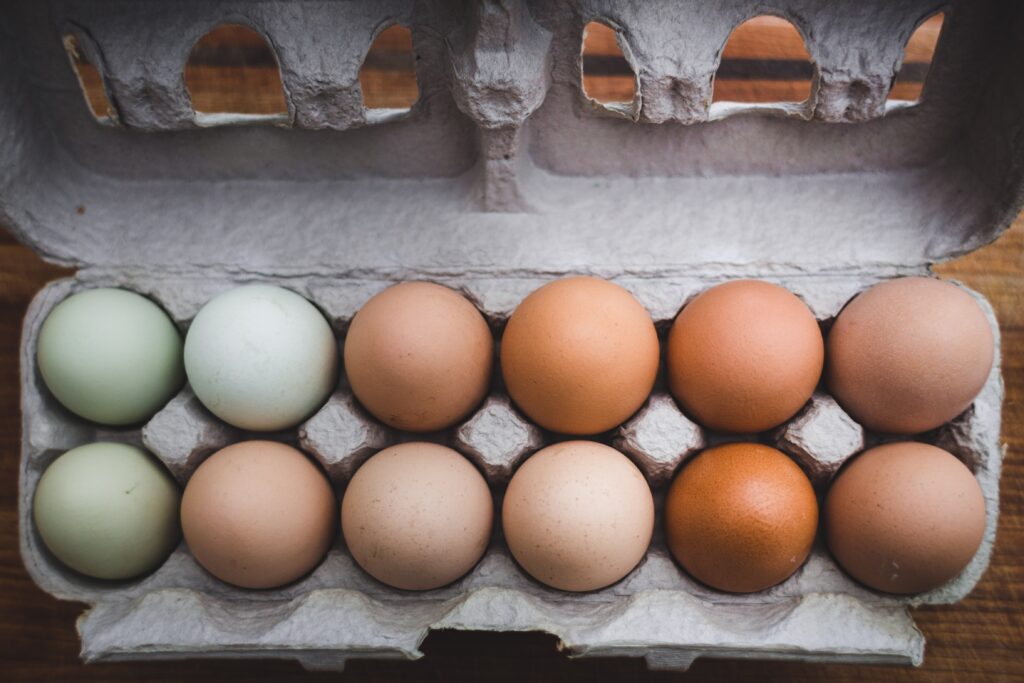The Most Healing Foods for Postpartum Recovery
So you’ve just had your baby. Labor can be extremely taxing on the body, and now your healing postpartum journey begins.
If you’re anything like most moms, the first thing you want to do is eat after labor and delivery. Most hospitals don’t allow eating during the labor process, and even if you had a home birth chances are the process of giving birth has made you weak and needing nourishment.
The foods we eat fuel our bodies. They can either build us up or leave our body susceptible to illness. In a similar way, what you eat postpartum can either hinder or aid in your recovery.
So what are some foods that can aid in your healing process after giving birth?
Listed below are 15 of the best foods for postpartum recovery. Using these foods in simple hearty recipes will help you enter the fourth trimester with your best foot forward.

*Just so you know, this post contains affiliate links. As an affiliate and Amazon Associate, I earn from qualifying purchases. See my full disclosure here.
What to Eat After Delivery - 15 Best Foods for Postpartum Recovery
If you’ve been wondering what to eat after delivery, then we’ve got you covered with these 15 postpartum healing foods.
Keep in mind that certain foods can trigger gas, colic, and even eczema in some babies, so I encourage you to keep a food log if you’re a nursing mom.
1. Bone Broth

It might seem like a strange food on it’s own, but good quality bone broth is a cozy, warm drink with loads of benefits. It is gentle on the digestive system, making it one of the best foods to eat immediately after giving birth.
Bone broth is high in collagen, which is vital for restoring and rebuilding tissues postpartum. It can help heal the wound where your placenta was, rebuild the tissue of your uterus and pelvic floor, and revitalize any stretched out skin.
Bone broth also has plenty of protein to give you the strength you so desperately need after labor.
This powerhouse food contains vitamins and minerals to help new mamas replenish nutrients and bone density, combat fatigue, balance out hormones, boost the immune system, heal the gut; the list goes on and on.
It’s easy to make your own broth using the bones and some veggie scraps after you cook a whole chicken. You can also make beef, pork, and even turkey bone broth as well.
If you’re not up for cooking, check your local health food store, as many do carry packaged bone broths. I’m a big fan of the Bonafide Provisions brand.
2. Dark Leafy Greens
Some dark leafy greens include spinach, kale, swiss chard, collard greens, romaine, and arugula. These foods are full of vitamins, minerals, and fiber, which will help boost your immune system and aid in producing some good bowel movements after giving birth.
Among many health benefits, eating more leafy greens can also help in lowering blood pressure, which is crucial if you struggle with or have a family history of preeclampsia.
To introduce more leafy greens into your diet you could put them in salads, grain bowls, soups, or even as sides with some other nourishing foods for postpartum.
3. Eggs

Eggs are high in protein, and the yolks contain vitamins A, B12, D, E, and K, as well as folate, choline, and omega-3 fatty acids. They are a powerhouse for postpartum recovery and will help your immune system and strength level.
Because of the vitamin K, B12, and folate, eggs help with blood clotting, promote healthy blood flow, and help your wounds clot and heal faster postpartum. This is good news whether you had a c-section or a vaginal birth because of the internal wound where the placenta was.
Try cooking your eggs in a well-seasoned cast iron skillet, so they are also higher in iron. If you are on the go a lot, boil them for a quick and easy snack.
The best place to buy eggs is from your local friend who has chickens, but if you don’t know anyone who owns chickens, look for pasture-raised at your grocery store.
4. Ginger

You might have used ginger candies for nausea while pregnant, but it is common to be nauseous postpartum as well.
It isn’t just for nausea though! Ginger also aids in breastmilk production and is full of antioxidants that can help boost your immune system.
Ginger can be used in teas, soups, and marinades.
5. Liver
There’s a reason our grandparents ate liver, and it might not have been the taste. 😉
Liver is a nutrient-dense superfood. It’s high in vitamin A, folate, and zinc. It also contains plenty of iron to help replenish and restore blood. You lose a good amount of blood while giving birth, especially if you hemorrhage, so more iron is essential in a postpartum diet.
If you can’t stand the taste of liver, try cutting it into small, pill-sized bites to swallow with water, or consider purchasing it in desiccated capsules.
6. Oats
Eating good quality oats can help boost breast milk production. They’re also a good source of iron for restoring blood and fiber for combating postpartum constipation.
You can use oats to make protein balls for an easy breastfeeding snack or oatmeal for a hearty breakfast with blueberries and local honey drizzled on top.
7. Salmon

Salmon is high in vitamin B12, omega-3s, and DHA.
It aids in breast milk production, and it is even believed that introducing more salmon into your diet could help ward off postpartum depression.
When shopping for salmon, wild-caught, farm fresh, or even canned salmon will help give you the nutrients you need for a smoother recovery.
8. Red Adzuki Beans
Red adzuki beans can help you get rid of all that water retention postpartum, while also promoting good bowel movements.
They are high in fiber, protein, vitamins, and beneficial plant compounds.
You can use them in curry, soup, or even simple buddha bowls.
Continue reading below.
My Postpartum Book Picks
9. Broccoli

Broccoli is high in fiber and can help with inflammation and regulating bowel movements.
Often, postpartum bowel movements can be difficult for a while because of hemorrhoids and postpartum constipation due to dehydration.
Eat some broccoli raw with hummus or cooked in rice bowls for a nutrient-dense meal.
10. Herbal Teas

There are many teas you can reach for when it comes to postpartum healing.
Red raspberry leaf tea helps heal uterine and pelvic muscles and may even help prevent postpartum hemorrhaging.
Red date tea is great for circulation and will help with your energy and stamina after giving birth.
Nettle tea is a powerhouse of a tea for postpartum. It aids in decreasing swelling, loosening stools, giving energy without the negative side effects of caffeine, and also supporting milk supply.
11. Nuts

If you want some extra energy and are struggling with getting your strength back after birth, then nuts would be a great option, because nuts, especially almonds, are a great source of protein.
They’re also high in antioxidants to help cleanse your body after childbirth and omega-3 fatty acids to help minimize those baby blues.
Try some peanut butter or almond butter on whole grain toast. Just be sure it is made up of primarily nuts and not high in processed sugars that could slow your healing process. A handful of almonds with an apple is also a great snack for pregnancy and postpartum.
12. Water
It might seem obvious, but drinking a lot of water is crucial postpartum.
If you’re nursing, water is extra important because not only does breastfeeding require you to drink more water, but your body is releasing oxytocin, which will make you extra thirsty.
The best temperature of water is warm, but not hot. Throw some sliced lemons in to aid in digestion and give your immune system a boost. Lemon water is also known to help flush toxins out.
Take things up another notch with coconut water, which is filled with electrolytes for re-hydration, energy, and boosting
breast milk supply.
13. Avocados

There is a reason that avocado toast took the world by storm and is still popular today.
Avocados are full of healthy fats, which if you’re breastfeeding, will contribute to the continuing development of your baby’s brain. They’re also anti-inflammatory and help increase nutrient absorption.
Ripen them in a paper bag on your counter, but keep in mind that once they’re ripe they will need to be eaten right away. They’re great in tacos, buddha bowls, as toppings on soup, with omelets, and of course, on toast.
14. Fermented Foods
Fermented foods, such as yogurt, kefir, and sauerkraut, have good live bacteria and organic acids which promote a healthy gut biome.
If you received antibiotics for any reason during the labor process, it is very important that you heal your gut postpartum. The healthier your gut is, the better your immune system and digestive system will function.
Sauerkraut can even be made at home, and yogurt and kefir come in many different flavors, so you have plenty of options to choose from. Just try to steer clear of ones that are high in sugar.
15. Garlic
Garlic sure adds a lot of flavor, but it also has tons of medicinal properties for nursing mamas and their babies.
Garlic is excellent for boosting the immune system, helping you to fight off illness and infections and heal quicker postpartum.
It also helps regulate blood pressure, digestion, and may even help boost breast milk production.
Add garlic to warming soups, mix it into pasta dishes, or even use it as a garnish for your morning toast.
Simple and Nourishing Postpartum Meals
Nutrition can be a very difficult subject. As you look to heal your body postpartum, give yourself some grace. You’re an incredibly strong person who just gave birth and became a mom.
During the fourth trimester take healing one step at a time and remember healing is not linear. It’s full of ups and downs and that’s okay.
Making hearty and healing postpartum meals doesn’t have to be complicated or stressful. Knowing the benefits of these postpartum foods and incorporating them into simple, nourishing recipes can play a valuable part in your fourth trimester.
What food sounds good to you? Comment below and don’t forget to share with your other mom friends!





